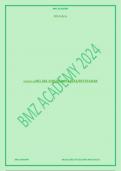Exam (elaborations)
ASSIGNMENT 6 MNG2601_SEMESTER 1 2024 SEARCHABLE Which motivation theory postulates that people will act according to their perceptions that their work will lead to certain performances and outcomes and by how much they value the outcomes? All people, r
- Institution
- University Of South Africa (Unisa)
ASSIGNMENT 6 MNG2601_SEMESTER 1 2024 SEARCHABLE Which motivation theory postulates that people will act according to their perceptions that their work will lead to certain performances and outcomes and by how much they value the outcomes? All people, regardless of their personal profile, ha...
[Show more]



